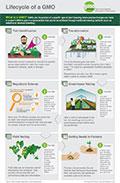Question
How would a world with no GMOs affect the average person
Submitted by: mx135
Answer
Expert response from Scott Kohne
NAFTA Market Acceptance Manager, Seeds & Traits Unit, BBASF
Wednesday, 30/04/2014 14:43
In trying to imagine a world without genetically modified (GM) plants, I would need to think back to the state of agriculture over 20 years ago and consider the impact of removing the tools and solutions that more than 18 million farmers in 27 countries have become accustomed to using in order to effectively and sustainably manage insects, weeds and diseases that rob yield and damage harvests, ultimately reducing farmers’ incomes and well-being. I imagine that the planet would also be suffering more from further loss of arable farm land as a result of the continued inevitability of climate change and resource scarcity, ultimately limiting the food, feed and fiber for our expanding population.
A world without GM technologies would certainly impact not only the farmer’s toolbox of solutions to deal with these issues but also the world that we currently live in. Specifically, it would affect a sure source of safe, healthy and nutritious food at a reasonable cost, which we have grown accustomed to in more than 27 nations currently cultivating GM crops.
According to the International Service for the Acquisition of Agri-biotech Applications (ISAAA), between 1996 and 2012, GM crops contributed to food security, sustainability and the environment/climate change in many ways, including:
- Increasing crop production, valued at $116.9 billion USD
- Conserving biodiversity by saving 123 million hectares of land
- Helping to alleviate poverty for 16.5 million small, resource-poor farmers and farm families (equaling approximately 65 million people total)
- Reducing agriculture’s environmental footprint by reducing CO2 emissions by 26.7 billion kg (equal to taking 11.8 million cars off the road for one year)
Farmers today utilize a collection of technologies and methods of farming and choose the available systems that meet the needs of their customers and markets and their farming goals. Their ability to assess for themselves the needs and solutions to ensure their farm stays economically viable and sustainable is paramount for them. From a crop-production perspective, it is vital that we continue to support both consumer and farmer choice.
In recent years, we have seen direct impacts—such as weather—on food, feed and fiber production, which should have significantly and negatively impacted the quality, cost and availability at the consumer level. However, one reason we haven’t experienced such significant impacts is the contribution that GM technologies provide those farmers that choose to use them. For example, the drought the U.S. has been entrenched in has been stabilized through modern plant varieties more resilient to drought. The problem with weed control in crops grown in the Southeast, which is now spreading through much of the U.S., is being addressed through the introduction of new plants with better options for more effective and sustained weed management—e.g., new herbicide-tolerant plants, along with rotations of chemicals, crops and management activities.
While many people do not realize how their lives are affected by biotechnology on a daily basis, I believe a world without GM plants would set us back considerably in addressing many of the critical challenges faced by farmers who are striving to produce healthy and nutritious food, feed and fiber for consumers globally.
The development of innovative solutions to sustain and enrich our complex planet takes time that we cannot afford to waste. The use of GM technologies in plant breeding is one proven way of using our time effectively and thus enabling rapid and vital progress. In almost 20 years, the use of GM plants has been adopted at 100-fold rates by millions of farmers, most of them under the poorest and most challenged conditions. I would like to imagine where we could be 20 years from now.
GMO Innovation Contest Recap!
